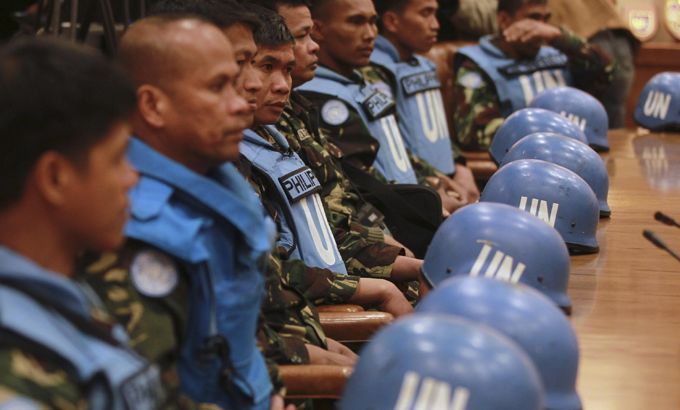
Syria: Military gains and diplomatic pains?
We look at the conflict’s most recent developments where kidnappings and political tactics have dominated the headlines.
It has been a week of military gains by the opposition and diplomatic maneuvering.
|
“We are not sure about their (Martyrs of Yarmouk Brigade) ideas and programme for Syria. According to what they used to say is that they are ready to leave Syria once the regime falls down … they cannot control the country they are not that big a front.“ – Hisham Marwah, legal commission of the Syrian National Council |
On Tuesday, rebel fighters said they had captured the city of al-Raqqa making it one of the most significant gains by the opposition after two years of fighting. The city sits on the north bank of the Euphrates river about 160km east of Aleppo.
And this could yet turn out to be a major turning point in the course of the uprising.
On Wednesday, a meeting of Arab Foreign ministers in Cairo offered the Syrian oppostion coalition a seat at the Arab League but on one criticial condition – that it first form a representative executive council.
Syria’s main opposition group says it will pick a new provisional prime minister on Tuesday after former premier Riad Hijab, who defected last year, withdrew his candidacy.
|
“At the end of the day, when there is no common enemy, I think Syrians will be capable of doing the job (of governance) for themselves. The one thing we have been saying for a long time (to the world) don’t let this go on for a long time because the consequences will be worse than interfering and ending it as soon as possible.“ – Mohammad Bassam Imadi, member of the Syrian National Coalition |
Hijab has faced some challenges from Syrian National Coalition members because of his previous ties to the al-Assad government.
This would appear to be part of the attempt to form an executive council in accordance with Arab League conditions.
Meanwhile, Britain said it is sending more support to opposition forces in Syria. The country’s foreign secretary, William Hague, said the UK will supply the fighters with armoured vehicles.
The move has been criticised by the Syrian government.
Bouthaina Shaaban, the political and media advisor to Syria’s President Bashar al-Assad, told reporters in India’s capital, New Delhi, she is surprised that Britain is providing assistance to the rebels.
She maintains the equipment would help al-Qaeda and other fundamentalist groups that exist within the Syrian opposition.
|
“You will hear those UN soldiers and they said that the regime tried to kill them directly, he (Bashar) tried to shell all the area, he used some air missiles to kill them. But I think now the situation will be better and it will be finished by now (sic).“ – Louay Almokdad, coordinator for Free Syrian Army |
And also on Wednesday, armed fighters in Syria detained 21 UN peacekeepers in the volatile Golan Heights region.
The Filipino soldiers were taken by a group claiming to be members of the opposition group – Martyrs of Yarmouk Brigade. Their spokesman, Abu Kaid al-Faleh accused the UN force of cooperating with the Syrian army against the rebels.
Several groups including the Philippines government and the United Nations were involved in negotiating thier release.
To discuss these developments and more on Inside Syria, presenter Mike Hanna speaks to guests: Joseph Holliday, a senior research analyst for the Institute for the Study of War; Hisham Marwah, a member of the legal commission of the Syrian National Council and he is also a member of the Syrian National Coalition; Louay Almokdad, the political and media coordinator for the Free Syrian Army; and Mohammad Bassam Imadi, member of the Syrian National Coalition. Imadi is also a former member of the Syrian National Council and the former Syrian ambassador to Sweden.
|
” … this conflict has become resource-driven and as much as it’s significant to create an executive body to get the buy-in from the international community that can actually increase the resource flows, the end state here, and the only way the Syrian National Coalition can eventually become the government of Syria, is by maintaining buy-in from the people fighting on the ground through the ability to provide them with resources. Joseph Holliday, Institute for the Study of War |